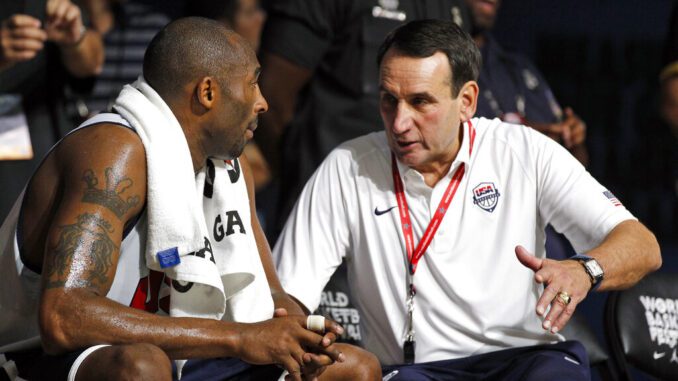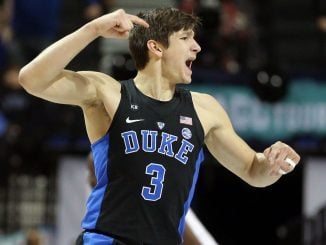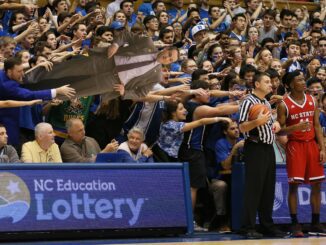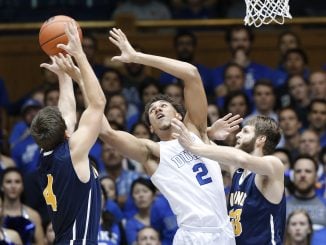
From the sound of it, coach Mike Krzyzewski got out of college athletics just in time.
The former Duke coach and basketball hall of famer was highly critical of the current NCAA environment when he appeared on a panel discussion on America’s role in global sports.
“To me, it looks like right now we’re taking care of the best TV contracts,” he said. “It’s really kind of ridiculous that we’re going to have teams traveling from the West Coast to the East Coast and that there’s no Pac-12. Like, what the hell are we doing? Really. We should be ashamed really of where we’re at right now.”
As he did numerous times while still coaching the Blue Devils, Krzyzewski criticized college sports for not having clear leadership and one voice.
“That’s where we’re at right now,” he repeated. “And wherever you’re at, that’s where you’re at. Now, you have to figure out where are we going. Right now, there’s not a clear-cut course about where we are going. We need to set the course.”
Krzyzewski appeared at the forum, which was hosted by Duke as part of the Ambassador Dave and Kay Phillips Family International Lecture series. Also on the panel were NBA commissioner and Duke graduate Adam Silver, former chairman of the Joint Chiefs of staff and Duke graduate Gen. Martin Dempsey, and CEO of the U.S. Olympic and Paralympic Committee and Duke graduate Sarah Hirshland.
The group discussed a wide range of topics, including the wisdom of boycotting international sporting competitions like the Olympics for political reasons, using sporting event ceremonies like the national anthem to stage political protests and the use of sports to break down barriers between different political systems.
“There are bad people in the world,” Silver said. “There may be points where wars are necessary, where military might is necessary. To me, at least, the goal is to do everything possible to avoid that. I think sports is one of those ways. Yeah, we may have different systems, but how can we find places to create empathy?”
Dempsey raised the issue of kneeling and other forms of protest during the anthem.
“When’s the last time you heard the national anthem other than at a sporting event? You’d probably be hard-pressed to recall,” he said. “I spent 41 years defending people’s right to individual expression. It’s one of the foundational pillars of democracy. I understand in moments of great tension and emotion, someone might choose to not live up to the ritual (of standing during the anthem). Can someone not participate in the ritual? Of course. Should they? Of course.
“I told the athletes,” he continued, “when you play for the Knicks, you represent the 17 million people in that city. When you’re playing for us, you represent the whole country, the people who agree with you and those who don’t. Yes, the country has issues. You can help us rise above them.”
Krzyzewski discussed how he handled the anthem issue as longtime coach of the national team.
“In international competition, you have to remember, two anthems are played before every game — yours and the opponent’s,” he said. “And you show respect for both.”
Coach K spent a great deal of time and attention making sure the members of Team USA understood the gravity of representing their country.
“He introduced them to military members,” Dempsey said. “We lined up 16 soldiers and the 12 players and four coaches, and the soldiers tore the Velcro flag off their uniform and closed ranks with the athletes to give them the flag and said, ‘This is it. This is what you’re going to do. We do it every day. Now you get to do it for a while.’”
“They also gave them their dog tags,” Krzyzewski added. “They wore them everywhere. They still have them. We wanted our guys, when the national anthem was played, to know they represented the person who just gave them that patch or dog tag.
“In Beijing, when we put the team together,” Coach K continued, “the first night, I told them, ‘When you go back to your suites, I want you to be 16 years old again for one minute.’ And we had laid their Olympic uniform on their beds. I wanted them to look at it and think about what it means.”
Later that night, Krzyzewski said he was playing video poker when he got a tap on his shoulder. He turned and saw Kobe Bryant.
“What’s up?” he asked.
“Coach,” Bryant said. “I did what you asked me to do.”
“What happened?”
“I cried.”
“There’s that level of emotion playing for your country,” Krzyzewski said. “It gets to a different part of them, where they don’t just hear and see, but they feel, and they own it. And if they own it, they’re going to perform at a higher level.”
Now, if only Krzyzewski could inspire the powers that run college athletics to find a higher level.



